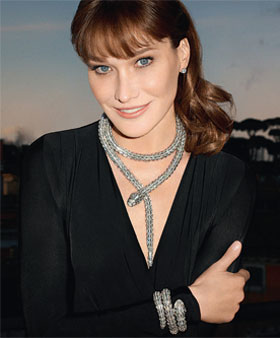Vanessa Friedman: Carla Bruni-Sarkozy, the new face of Bulgari

Roula Khalaf, Editor of the FT, selects her favourite stories in this weekly newsletter.
One of the more notable moments of the recent Paris couture week occurred at a very fancy party hosted by Bulgari in a former palace now used as the Chamber of Commerce on Avenue Friedland. As attendees milled around the gardens, swilling champagne, snacking on stuffed tomatoes and chatting to the various executives – outgoing chief executive Michael Burke (who has moved to Vuitton), incoming chief executive Jean-Christophe Babin and Francesco Trapani, head of watches and jewellery at LVMH – models sporting elaborate jewels mingled with guests such as Milla Jovovich, Alexa Chung and Bradley Cooper.
Of all the executives, models and celebrities in attendance, however, none drew as many sideways glances and surreptitious whispers as the new face of Bulgari’s Diva collection and the star of its forthcoming ad campaign, resplendent in black trouser suit and 43-carat sapphire necklace – France’s former first lady Carla Bruni-Sarkozy.
You can understand the stares: as far as I know, this is the first time a former head of state’s wife has become the model for a luxury brand. And that has some interesting implications.
No matter how much Monsieur and Madame Sarkozy would like to be considered as separate entities, history teaches us they will be judged as a package; it’s hard to imagine Bruni-Sarkozy would have made the decision to sign on with Bulgari without consulting her husband. Which in turn suggests that the former president thought it was a good idea. And when it comes to politicians, there’s no such thing as a casual next move.
On one level, Bruni-Sarkozy’s decision should not be a surprise. The old archetype of the first lady who is seen and not heard is clearly on the way out. Just as ex-heads of state or government parlay their time in the leadership chair into lucrative speaking/writing/board engagements, so their spouses are continuing to contribute to the bottom line. Especially those as young as Bruni-Sarkozy, who is just 45.
Hillary Clinton went back to work (OK, that’s putting it mildly) when her husband left the White House. Presumably, Samantha Cameron will return to active Smythson duty when the Prime Minister’s term is over, and the smart money is on Michelle Obama going back to work, using both her legal mind and her charisma. Bruni-Sarkozy was a model pre-Elysée, so why shouldn’t she return to what she knows?
Besides, it’s not as if there isn’t a tradition of French former first ladies cultivating a close relationship with fashion: after her husband left politics, Bernadette Chirac became a regular on the front row at Chanel and joined the board of LVMH.
There’s also the fact that older models are having something of a come-out-of-retirement moment, with Christy Turlington appearing in ads for Prada, Calvin Klein and Jason Wu, and Yasmin Le Bon as the face of Monsoon’s spring/summer campaign.
So why does it still sit so oddly to think of Bruni-Sarkozy fronting a luxury brand?
In part, because it seems so commercial. There is not, as far as the brand has revealed, a charitable component to their collaboration; it’s not as if Bruni-Sarkozy is using the Bulgari platform to highlight global issues. And unlike a speech, which might be paid for but can be spun as serious thought about an issue, there’s no disguising the relationship here between appearance and income.
Then there’s the problem of stereotype, the usual fashion/luxury bugbear. Because despite all the work it is currently doing – to preserve national heritage sites, to train Europe’s unemployed youth and to render its production methods more sustainable – fashion is still dismissed as superficial. Elitist. Indulgent. Not serious.
But above all, there’s the fact that no one should understand this better than Nicolas Sarkozy himself, who was often called “President Bling-Bling” due to his taste for expensive watches and sunglasses. Indeed, when he was running against current president François Hollande, the aesthetic contrast between the opponents was used to crystallise the choice between them.
Rumour has it that Sarkozy is considering another presidential bid. It’s hard not to wonder what impact six months of his wife adorned with glittering gems in magazines everywhere might have on a future campaign. But perhaps that’s actually the point?
Maybe he is calculating that five years of bland will make bling look appealing, and that the ad campaign will keep their names prominent without any effort – not to mention appealing to those disenfranchised by Hollande’s tax plans. Bulgari is, after all, now owned by LVMH, which is run by one of France’s richest men, Bernard Arnault – who also happened to be a witness at the Sarkozys’ wedding.
And you thought this was just about jewellery.
Cherchez la femme, as they say.
More columns at www.ft.com/friedman
Comments